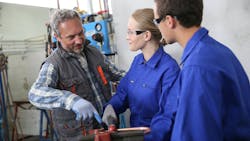Whole-Trade Learning: the Lost Art That Built Better Plumbers
Key Highlights
- The decline in dedicated apprentices threatens the future of skilled pipe trades
- Whole trade education teaches understanding of entire systems, not just isolated tasks, leading to better problem-solving
- Investing in comprehensive trade education now is essential to prevent a skills gap as experienced journeymen retire
Long-time readers of my columns know that I am a big advocate of “whole trade” teaching and learning. The trend toward specialized “techs” is dismaying to this old plumber. Today, there is by necessity, a concerted effort bring new apprentices into all the trades, but my focus is on the pipe trades. To put it bluntly, there are not enough good apprentices coming into the trades and those that are being wooed by the pipe trades seem to have a less than eager wish to invest the time to learn it.
How many new hires are willing, today, to enter a five-year apprenticeship program where they will work in the trades for 40 hours per week or more before they can be called a “journeyman”? Where is the dedication to excellence? The available hires do not seem to want to invest in the long term. As sad as it is to say, “instant gratification” seems to be the watchword of our current pool of prospective hires.
Too Little, Too Late?
I have said before that, in my humble opinion, the moves being made to inject trade education into our young people is too little, too late, but I may be in the minority on that score. The lack of available apprentice candidates and the looming retirement of the last breed of true pipe trades journeymen, presages a disaster (or some lesser form of ill results) that will surely be here in the next twenty or so years.
It begs the question, “who will plumb (or provide pipe services for) the new buildings that are on the drawing boards now, or service, repair and remodel the existing ones?” The answer, of course, is poorly trained and inexperienced people who have no sense of the totality of what it is they are working on, let alone the integration of the systems they are installing with the other trades.
Which brings me to the topic of this column: skills vs. technical training. In days gone by, when a trade career was something to aspire to, we had a pool of people we could draw from to train in the arts of plumbing and pipe-fitting. It was a tried and true means of identifying the most skilled new apprentices to teach the trade to, while winnowing out the less skilled (or less motivated) apprentices.
Today, with the lack of such a pool of people to draw on, you “get what you get” and try to make the round peg fit in the round hole. Sometimes it works, and sometimes it doesn’t. So, in order to get a modicum of ability into the field, “tech” training has become popular.
Skill
The difference between a truly skilled apprentice and a “tech” trainee is measurable. Oh, sure, you can teach someone to install a DWV system, and maybe even to teach how and why each phase of that system works. To teach a “tech” that whole system is, by today’s standards, a waste of time and money. Simply teaching a person how to put something together and not teaching them what comes next does a great disservice to the trainee as well as the shop for which he (or she?) works.
On the other hand, a truly skilled apprentice (it’s in the hands) who learns the whole system approach to the trades, can (and usually does) prevent many issues from cropping up down range after the work has been installed and inspected. The skilled apprentice is taught to understand the “whys” of something, not just the “how.” They can anticipate problems further down the line if what they do now is not done correctly, so that their work integrates with the work of the other trades seamlessly.
(I am thinking now of running overhead piping and avoiding conflicts with duct-work and/or fire suppression piping, as one example.)
Is it “Piling On”?
Some of my critics might claim that I am “piling on” ills to the detriment of tech training—but am I? In a recent conversation with a “tech” about installing a dishwasher in a friend’s home, the tech couldn’t figure out why the water couldn’t discharge as it was supposed to. I asked, innocently, if he had checked the discharge piping and pump for debris. He answer was “we aren’t trained to do that.” As it turned out, there were packing materials clogging the discharge hose. So much for tech training and whole trade education.
Knowing how things work can lead to the understanding of why they are, or are not, working, which then leads to the next logical steps. A simple understanding of the entirety of the system (or equipment) makes all the difference.
A properly trained and skilled apprentice should have curiosity about what he (or she) is doing, not simply, and dogmatically, going through the motions. Doing a job and getting it right is the end game here.
Callbacks = Profit Killer
In a service business, callbacks are profit killers, with partially trained techs, callbacks are more likely. Part of the training spent on a fully integrated apprentice is on how to avoid callbacks, not so much with tech training. It is the difference between getting the job done and getting the job done right!
About the Author
Al Schwartz
Founder
The Brooklyn, N.Y.-born author is a retired third generation master plumber. He founded Sunflower Plumbing & Heating in Shirley, N.Y., in 1975 and A Professional Commercial Plumbing Inc. in Phoenix in 1980. He holds residential, commercial, industrial and solar plumbing licenses and is certified in welding, clean rooms, polypropylene gas fusion and medical gas piping. He can be reached at [email protected].
